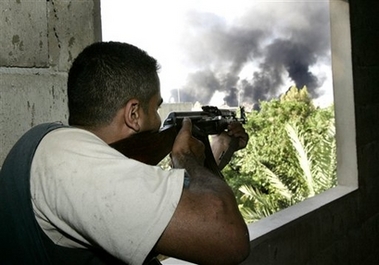Lebanese army pounds Palestinian camp
(AP)Updated: 2007-05-22 08:40
TRIPOLI, Lebanon - Lebanese troops blasted a Palestinian refugee camp with artillery and tank fire again Monday, seeking to destroy a militant group with al-Qaida ties. The barrage smashed buildings and sent plumes of black smoke towering over the crowded camp on the Mediterranean.
Refugees in the Nahr el-Bared camp, on the outskirts of the northern port city of Tripoli, hid in their homes as fighting raged, and Palestinian officials in the camp said nine civilians were killed Monday. Reports from the camp could not be confirmed because officials and reporters could not get inside.
"There are many wounded. We're under siege. There is a shortage of bread, medicine and electricity. There are children under the rubble" of damaged buildings, Sana Abu Faraj, a resident of the camp, told Al-Jazeera television by cell phone.
All day, automatic gunfire and explosions rocked the camp - which is more like a small town, with more than 31,000 people living in two- or three-story white buildings on densely packed narrow streets alongside mosques, schools and businesses. Raging fires sent large clouds of black smoke into the sky, and shells could be seen thudding into some of the taller buildings.
Hundreds of Lebanese troops surrounded Nahr el-Bared, staying outside in accordance with a nearly 40-year-old agreement with the Palestinians. The troops pounded the camp with artillery and tank fire, and militants responded with gunfire and mortar rounds.
The army is seeking to uproot a militant group called Fatah Islam, which arose in the camp late last year. The group touts itself as a Palestinian liberation movement, but many view it as a nascent branch of al-Qaida-style terrorism with ambitions of carrying out attacks around the region.
Nevertheless, the military assault adds yet another layer of instability to Lebanon's potentially explosive politics. Prime Minister Fuad Saniora's government already faces a domestic political crisis, with the opposition led by Iranian- and Syrian-backed Hezbollah demanding its removal.
Fighting quieted after nightfall amid attempts by other Palestinian factions to broker a cease-fire. The representative of the Palestinian militant group Islamic Jihad, Abu Ahmed Rifai, said Fatah Islam militants pledged to cease firing and withdraw from positions facing Lebanese troops. A senior officer at Lebanese army command would not say a cease-fire was reached but repeated the military's stance that it will not shoot if it does not come under fire.
Raising fears of spreading violence, an explosion went off in a shopping area in a Sunni Muslim sector of Beirut later Monday, wrecking parked cars and injuring four people - a day after a bomb blast in a Christian part of the capital killed a woman. It was not known if the blasts had any connection to the fighting at the refugee camp.
Saniora now risks sparking a backlash among Palestinians in Lebanon's other refugee camps, where armed groups and Islamic extremists have been growing in influence - and, in at least one case, have been sending recruits to fight US troops in Iraq. If the military moves into Nahr el-Bared in force, it could trigger widespread anger around the Arab world, particularly at a time when Israel is battling Palestinians in the Gaza Strip.
The White House said it supports Saniora's efforts to deal with the fighting, and the State Department defended the Lebanese army, saying it was working in a "legitimate manner" against "provocations by violent extremists" operating in the camp.
The leader of Fatah Islam, Palestinian Shaker al-Absi, has been linked to the former head of al-Qaida in Iraq and is accused in the 2002 assassination of a US diplomat in Jordan. He moved into Nahr el-Bared last fall after being expelled from Syria, where he was in custody.
Since then, he is believed to have recruited about 100 fighters, including militants from Saudi Arabia, Yemen and other Arab countries, and he has said he follows the ideology of al-Qaida leader Osama bin Laden. Among the militants killed in the fighting Sunday was a man suspected in a plot to bomb trains in Germany last year, according to Lebanese security officials.
Lebanese security officials accuse Syria of backing Fatah Islam as a tool to disrupt the country. "They are not al-Qaida. This is imitation al-Qaida, a 'Made in Syria' one," a national police commander, Maj. Gen. Ashraf Rifi, said, referring to Fatah Islam.
Syria - which hosts a number of Palestinian militant groups, including Hamas - controlled Lebanon until 2005, when its troops were forced to withdraw from the country following the assassination of former Lebanese prime minister Rafik Hariri. But Syria's opponents in Lebanon accuse it of seeking to re-establish its control through its allies, including Hezbollah.
Syrian Foreign Minister Walid Moallem insisted Damascus had nothing to do with the Fatah Islam and has been seeking Interpol's help in arresting its members.
"Fatah Islam is rejected and does not serve the Palestinian cause. On the contrary, it harms it in every way," he said in Damascus. Syria closed a border crossing near Tripoli, though other crossings into Lebanon remained open.
A spokesman for Fatah Islam, Abu Salim, warned that if the army siege did not stop, the militants would step up attacks by rockets and artillery "and would take the battle outside Tripoli."
"It is a life-or-death battle. Their aim is to wipe out
Fatah Islam. We will respond and we know how to respond," he told The Associated
Press from the camp.
| 1 | 2 |  |
|
||
|
||
|
|

